“¿Quién puede entrar en el santuario?”
Ética y adoración en el Salmo 24
Palabras clave:
Salmo 24, Yhwh rey, Ética, Adoración, Antiguo IsraelResumen
En el presente trabajo se analizará el Salmo 24 como “salmo de Yhwh rey”. Una vez presentada una propuesta de traducción al español, se analizará su disposición literaria, proponiendo los vínculos entre las secciones que muestran como Yhwh Sebaot, quien se identifica con el “rey de gloria” e ingresa en el santuario (vv. 7-10), espera de los peregrinos una conducta ética para permanecer en él (vv. 3-6).
Referencias
Alonso Schökel, L. (1987). Manual de poética hebrea. Madrid: Ediciones Cristiandad.
Alonso Schökel, L. (Ed.). (1994). Diccionario bíblico hebreo-español. Madrid: Trotta.
Alonso Schökel, L., & Carniti, C. (1992). Salmos: Traducción introducciones y comentario. Estella: Verbo Divino.
Aparicio Rodríguez, A. (2012). Comentario filológico a los Salmos y al Cantar de los cantares. Madrid: Biblioteca de Autores Cristianos.
Barthelemy, D. (Ed.). (2005). Critique textuelle de l’Ancien Testament. Fribourg, Switzerland, Göttingen: Academic Press; Vandenhoeck & Ruprecht.
Brown, W. P. (2010). «Here come the Sun» The metaphorical Theology of Psalms 15-24. En E. Zenger (Ed.), The composition of the book of psalms. Leuven: Uitgeverij Peeters.
Brueggemann, W., & Bellinger, W. H. (2014a). Psalms. New York: Cambridge University Press.
Carbajosa Pérez, I. (2018). Salmos. Madrid: Biblioteca de Autores Cristianos.
Craigie, P. C. (2004). Psalms 1-50. Nashville: Nelson.
Duke, R. K. (2011). Form and Meaning. Multi-layered Balanced Thought Structures in Psalm 24:4. Tyndalle Bulletin, 62(2), 215-232.
Elliger, K., & Rudolph, W. (Eds.). (1977). Biblia Hebraica Stuttgartensia. Stuttgart: Deutsche Bibelgesellschaft.
Erbele-Küster, D. (2016). Poetics and ethics: Psalm 27 as an exemplary reading. Canon&Culture, 10(1), 39-55. https://doi.org/10.31280/CC.2016.04.10.1.39
Escuela Bíblica y Arqueológica de Jerusalén. (2009). Biblia de Jerusalén (4a. Ed.). Editorial Desclée de Brouwer.
James, J. T. (2020). Research trends in the study of the ethics of the psalms. Currents in Biblical Research, 18(2), 118-141.
Jenni, E., & Westermann, C. (Eds.). (1978). Diccionario Teológico Manual del Antiguo Testamento. Madrid: Ediciones Cristiandad.
Joüon, P., & Muraoka, T. (2006). Gramática del hebreo bíblico (M. Pérez Fernández, Ed.). Estella: Verbo Divino.
Keel, O. (2007). La iconografía del Antiguo Oriente y el Antiguo Testamento. Madrid: Trotta.
Kraus, H.-J. (1995). Los Salmos. Salamanca: Sígueme.
Lambdin, T. O. (2001). Introducción al hebreo bíblico. Estella: Verbo Divino.
Meyer, R. W. (1989). Gramática del hebrero bíblico. Terrassa: Clie.
Mowinkel, S. (1962). The Psalms in Israel’s worship. Oxford: Blackwell.
Owens, D. C. (2013). Portraits of the righteous in the Psalms: An exploration of the ethics of book I. Eugene, Oregon: Pickwick Publications.
Rahlfs, A., & Hanhart, R. (Eds.). (2007). Septuaginta. Editio Altera. Stuttgart: Deutsche Bibelgesellschaft.
Sanz Giménez-Rico, E. (2014). Señor, roca mía, escucha mi voz: Lectura continua y concatenada de Salmos 1-30. Estella; Mardid: Verbo Divino; Universidad Pontificia de Comillas.
Stolz, F. (1978). צִיּ֔וֹן (E. Jenni & C. Westermann, Eds.). Madrid: Editiones Cristiandad.
Sumpter, P. (2014). The Coherence of Psalm 24. Journal for the Study of the Old Testament, 39(1), 31-54.
Van der Woude, A. (1978). צבא (E. Jenni & C. Westermann, Eds.). Madrid: Editiones Cristiandad.
Vilar Hueso, V. (1963). El Salmo 24: Unidad literaria y ambiente histórico. Estudios Bíblicos, 22(3-4), 243-253.
Descargas
Publicado
Cómo citar
Número
Sección
Licencia
Derechos de autor 2023 Pablo Vernola

Esta obra está bajo una licencia internacional Creative Commons Atribución-NoComercial-CompartirIgual 4.0.















